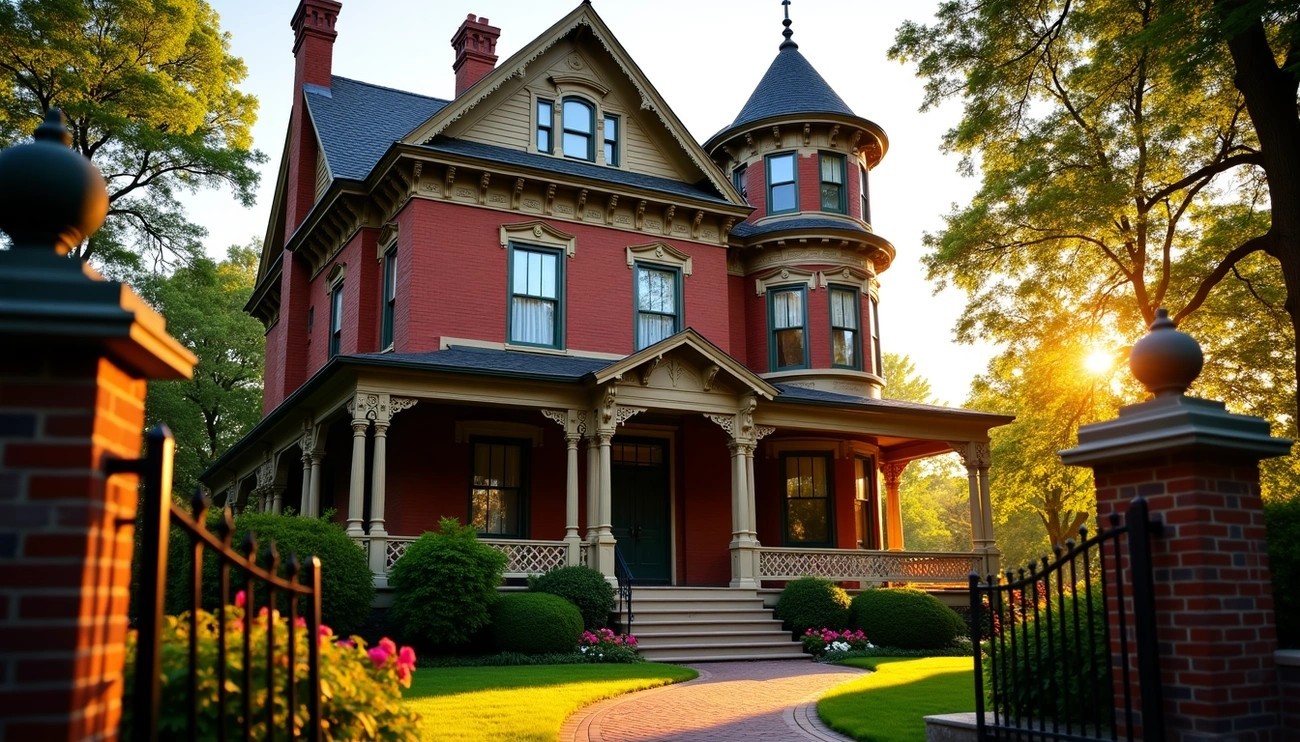Did you know that heritage property maintenance costs in Whitby homes can be up to 40% higher than maintaining standard properties?
While the charm and historical significance of these architectural treasures are undeniable, securing financing for them presents unique challenges that standard homebuyers rarely face. Heritage homes often come with special designation requirements, structural concerns, and renovation restrictions that can make mortgage lenders hesitant.
For many prospective buyers, this financial complexity becomes the biggest roadblock between falling in love with a historical Whitby property and actually owning one. The appraisal process alone can become complicated when dealing with homes that have irreplaceable architectural features or historical significance.
Fortunately, with proper preparation and knowledge of how heritage designations work, you can navigate the mortgage application process successfully. This guide will walk you through the specific financial considerations, help you find heritage-friendly lenders, and outline the steps to secure financing for your piece of Whitby’s history.
Let’s start by understanding what actually makes a Whitby home a heritage property and why this designation significantly impacts your mortgage options.
What Makes a Whitby Home a Heritage Property?
Heritage properties in Whitby represent more than just beautiful old buildings—they’re protected treasures with historical, cultural, or architectural significance. Understanding what qualifies as a heritage property and how these designations function is essential before pursuing financing for such homes.
How heritage designation works in Ontario
In Ontario, the Ontario Heritage Act governs the protection of heritage properties. Heritage designation occurs at three distinct levels:
- Individual Property Designation (Part IV): The local municipal council designates specific properties due to their cultural heritage value. This designation protects exterior features and sometimes interior elements that contribute to the property’s heritage value.
- Heritage Conservation Districts (Part V): These are entire neighbourhoods or areas with collective heritage significance. Whitby has several such districts where groups of properties maintain a cohesive historical character.
- Provincial Designation: For properties with exceptional provincial significance, the Minister of Heritage may designate them directly.
The designation process typically begins with identification by the municipal heritage committee, followed by research, evaluation against criteria, and ultimately a designation bylaw passed by the municipal council. Property owners receive notice throughout this process and have opportunities to object.
Types of heritage homes in Whitby
Whitby features diverse heritage properties reflecting its rich history since the town’s founding in 1855. Common architectural styles include:
- Victorian-era homes (1837-1901): Characterized by ornate details, bay windows, and steep roofs, these properties often showcase craftsmanship rarely replicated today.
- Edwardian structures (1901-1910): Featuring less ornamentation than Victorian homes but maintaining elegant proportions and classic details.
- Colonial Revival buildings: Inspired by early American architecture with symmetrical facades and classical columns.
- Early 20th-century Craftsman homes: Notable for their handcrafted details, natural materials, and distinctive front porches.
Many heritage properties in Whitby’s downtown core date from the mid-to-late 19th century, reflecting the town’s prosperity during that period. Properties may be listed (identified but not officially designated) or designated (legally protected), with different implications for owners.
Why this affects your mortgage process
Heritage designation significantly impacts the mortgage application process in several ways:
First, lenders must consider the additional regulations that limit what changes can be made to the property. Any renovation plans require approval from the heritage committee, potentially delaying repairs or improvements.
Second, mortgage lenders typically require specialized appraisals for heritage properties. These appraisals must account for both the historical value and the potential limitations on future modifications, which standard appraisers may not be equipped to evaluate.
Third, insurance costs for heritage homes are notably higher due to replacement cost considerations. If damaged, heritage features must often be restored using original materials and techniques rather than modern alternatives.
Fourth, lenders examine the property’s condition more carefully, knowing that heritage property maintenance requirements are stricter and typically more expensive than for conventional homes.
Finally, some lenders simply lack experience with heritage properties and may impose stricter lending requirements, higher down payments, or less favourable interest rates to offset perceived additional risks.
Understanding these factors helps explain why securing financing for a heritage home requires specialized knowledge and preparation—topics we’ll explore in the following sections.
Challenges of Getting a Mortgage for a Heritage Home
Securing a mortgage for a heritage home in Whitby presents several unique hurdles that standard property buyers seldom encounter. The distinctive nature of these historical properties creates complications throughout the financing process, often requiring specialized knowledge and preparation.
Structural and appraisal concerns
Heritage homes frequently feature outdated building techniques, materials no longer in common use, and structural elements that don’t align with modern standards. These characteristics create substantial challenges for both appraisers and lenders.
Appraisers must possess specialized knowledge about historical properties to accurately assess value. Unlike standard homes, where comparable sales provide straightforward valuation benchmarks, heritage properties possess unique architectural elements and historical significance that standard appraisal methods struggle to quantify.
Furthermore, lenders typically require thorough structural inspections beyond standard home assessments. These specialized inspections evaluate:
- Foundation integrity considering historical construction methods
- Electrical systems that may include outdated knob-and-tube wiring
- Plumbing systems potentially containing lead pipes
- Roof structures that may require period-specific materials for replacement
The age of most heritage properties also raises concerns about ongoing maintenance requirements. Lenders recognize that heritage property maintenance requires specialized skills and materials, which can affect the borrower’s long-term financial stability.
Insurance and renovation limitations
Insurance represents a major consideration for heritage property financing. Most lenders require comprehensive insurance coverage before approving a mortgage. However, insuring a heritage home typically costs considerably more than standard properties because:
- Replacement costs for period-specific materials are substantially higher
- Specialized craftspeople must be employed for repairs
- Full replacement value may exceed market value due to unique architectural features
Additionally, renovation limitations directly impact financing options. Heritage designation typically restricts modifications to protect historical integrity. Consequently, homeowners face constraints when planning upgrades or repairs, as any changes usually require approval from heritage committees. This approval process can delay urgent repairs, potentially increasing costs and creating scenarios where property value preservation becomes challenging.
These renovation restrictions also affect how lenders calculate loan-to-value ratios and assess the property’s long-term viability as collateral. Many lenders hesitate to approve mortgages for properties where future modifications might face regulatory barriers.
Lender risk perception
From a financial institution’s perspective, heritage properties represent increased risk for several reasons:
First, the specialized maintenance requirements and higher upkeep costs affect the borrower’s ongoing financial capacity. Lenders must consider whether applicants can manage both mortgage payments and the elevated heritage property maintenance expenses simultaneously.
Second, resale marketability concerns exist for heritage homes. The pool of potential buyers for such properties is generally smaller than for standard homes, potentially extending selling periods if foreclosure becomes necessary.
Third, many traditional lenders lack experience with heritage properties. Without specialized knowledge about heritage designations and their implications, many financial institutions adopt conservative lending approaches, including:
- Higher down payment requirements (often 25-30% versus 20% for standard properties)
- More stringent income verification
- Lower maximum loan amounts relative to property value
Those seeking heritage property financing often need to explore alternative lending options, including credit unions and specialized mortgage brokers who understand the unique nature of these historical treasures.
Understanding these challenges represents the first step toward successfully navigating the heritage home mortgage process in Whitby.
How to Prepare Financially Before Applying
Financial preparation is the cornerstone of successful heritage home purchases in Whitby. Given the unique financing challenges these properties present, thorough groundwork beforehand can make the difference between approval and rejection of your mortgage application.
Check your credit and debt-to-income ratio
Before approaching lenders, assess your financial health thoroughly. Most heritage-friendly lenders require credit scores of at least 680, though scores above 720 typically secure better interest rates. Pull your credit report from both Equifax and TransUnion to identify and address any discrepancies or issues.
Your debt-to-income (DTI) ratio plays an equally crucial role in loan approval. For heritage properties, lenders typically prefer DTI ratios below 40%, albeit some specialized lenders might accept up to 43% under exceptional circumstances. Calculate your ratio by dividing your monthly debt payments by your gross monthly income.
To improve these financial metrics:
- Pay down existing debts, especially high-interest credit cards
- Avoid applying for new credit in the months before your mortgage application
- Correct any errors on your credit report promptly
- Maintain consistent employment history
Estimate renovation and maintenance costs
Heritage property maintenance expenses require careful budgeting beyond standard homeownership costs. Create a comprehensive budget that accounts for both immediate and ongoing expenses.
First, commission a specialized heritage home inspection to identify immediate repair needs. These inspections typically cost between $500-$1,000 but provide invaluable information about required renovations. Subsequently, obtain detailed quotes from contractors experienced with heritage properties for any necessary work.
Furthermore, establish a dedicated maintenance fund covering ongoing heritage property upkeep. Financial experts recommend setting aside approximately 1-2% of the property’s value annually for maintenance—though for heritage homes, this figure often reaches 3-4% due to specialized care requirements.
Remember that heritage properties frequently need specialized materials and craftsmanship that cost significantly more than standard renovations. Accordingly, include these premium costs in your financial planning to avoid surprises after purchase.
Get pre-approved with a heritage-friendly lender
Not all mortgage providers have experience with heritage properties. Seek lenders who specifically understand the nuances of heritage home financing in Ontario.
During pre-approval, be prepared to provide more detailed financial documentation than typically required for standard properties. This often includes:
- Two years of tax returns and notices of assessment
- Six months of bank statements
- Proof of down payment funds (minimum 20% for most heritage properties)
- Detailed property information including heritage designation documentation
Local credit unions and certain specialty mortgage brokers often offer more flexibility for heritage properties than major banks. These institutions typically evaluate applications on a case-by-case basis rather than applying rigid automated qualification systems.
Pre-approval provides a realistic picture of your budget and strengthens your position when making offers. Nevertheless, remember that final approval remains contingent on property-specific assessments, particularly the specialized appraisal that evaluates both the property’s market value and its heritage characteristics.
Finding the Right Mortgage Lender
Selecting the right financial partner proves essential when purchasing a heritage property in Whitby. Not all mortgage lenders understand the unique considerations that heritage designations entail, making your choice of lender as important as your choice of property.
Look for lenders experienced with heritage homes
Specialized knowledge makes all the difference when financing heritage properties. Seek out financial institutions that specifically mention heritage property experience in their portfolios. Local credit unions frequently offer more flexibility than major banks for these unique properties. These smaller institutions typically evaluate applications individually rather than running them through automated systems that may reject heritage properties based on age alone.
Some mortgage brokers maintain relationships with lenders who regularly handle heritage property transactions. These brokers serve as valuable intermediaries who understand both your needs and the lender’s requirements. They can direct you toward financial institutions that recognize the value of heritage homes beyond standard valuation metrics.
Check online reviews and ask fellow heritage homeowners about their financing experiences. Personal recommendations often lead to lenders who appreciate the special nature of these historical properties.
Compare fixed vs. variable rates for older homes
For heritage properties, the fixed versus variable rate decision carries unique considerations. Fixed rates provide predictability—especially valuable given the potentially higher maintenance costs associated with heritage homes. Knowing your mortgage payment remains stable while managing variable heritage property maintenance expenses offers peace of mind.
Conversely, variable rates initially offer lower interest costs but introduce uncertainty. Since heritage homes often require unexpected repairs using specialized materials and craftspeople, adding financial uncertainty through variable mortgage rates might create unnecessary stress.
Consider the property’s condition when choosing between rate options. Well-maintained heritage homes with updated systems might warrant the savings from variable rates. Meanwhile, properties needing significant restoration work benefit from the certainty fixed rates provide during renovation periods.
Ultimately, remember that heritage home financing requires a long-term perspective. The mortgage product you select should align with both your financial situation and the specific needs of your historical property.
Steps to Apply and Close the Deal
Once you’ve found a suitable lender, the practical application process begins. The final steps require meticulous attention to heritage-specific details that standard homebuyers rarely encounter.
Gather required documents
Beyond standard mortgage documentation, prepare these heritage-specific items:
- Heritage designation papers showing the property’s official status
- Historical property records demonstrating previous renovations
- Current heritage committee decisions affecting the property
- Detailed cost estimates for any required heritage property maintenance
Organize these documents chronologically to create a comprehensive property history for your lender’s review.
Schedule a specialized home inspection
Standard home inspectors often lack heritage expertise. Instead, hire an inspector with specific heritage certification who understands:
- Period-appropriate construction techniques
- Historical materials assessment
- Heritage-specific structural concerns
- Original feature evaluation
Their report will identify both immediate concerns and long-term maintenance requirements essential for proper budgeting.
Understand legal and zoning restrictions
Prior to finalizing, thoroughly review:
- Property deed restrictions related to heritage status
- Municipal heritage bylaws affecting future modifications
- Conservation easements limiting property changes
- Zoning regulations for heritage districts
Request written clarification from the Whitby Heritage Committee regarding renovation limitations to share with your lender.
Finalize your mortgage and close
Throughout the closing process, maintain open communication between your lawyer, mortgage broker, and insurance provider. Ensure your lawyer reviews all heritage-related covenants in the property title. Afterward, establish a contingency fund specifically earmarked for unexpected heritage maintenance costs to protect your investment long-term.
Conclusion
Purchasing a heritage home in Whitby represents both a meaningful investment in local history and a unique financial undertaking. The distinctive challenges of heritage property financing certainly require careful planning and specialized knowledge throughout the mortgage process.
Heritage properties demand different approaches compared to standard homes because of their historical designations, maintenance requirements, and renovation restrictions. Therefore, potential buyers must prepare thoroughly before pursuing financing options. Your credit score, debt-to-income ratio, and financial reserves play crucial roles in securing approval for these specialized properties.
Finding the right lender proves equally important. Credit unions and mortgage brokers with specific heritage property experience offer valuable expertise that major banks might lack. These specialized lenders understand the unique appraisal challenges and insurance considerations inherent to historical properties.
Additionally, proper documentation becomes essential when applying for heritage home mortgages. Complete heritage designation papers, detailed inspection reports from qualified professionals, and thorough understanding of legal restrictions all contribute to a smoother approval process.
The journey toward heritage home ownership may appear daunting at first. Nevertheless, armed with the right knowledge and preparations outlined in this guide, you can successfully navigate the complexities of financing these architectural treasures. Your efforts will ultimately reward you with not just a house but a living piece of Whitby’s rich history – a property that combines historical significance with the comfort of home.







